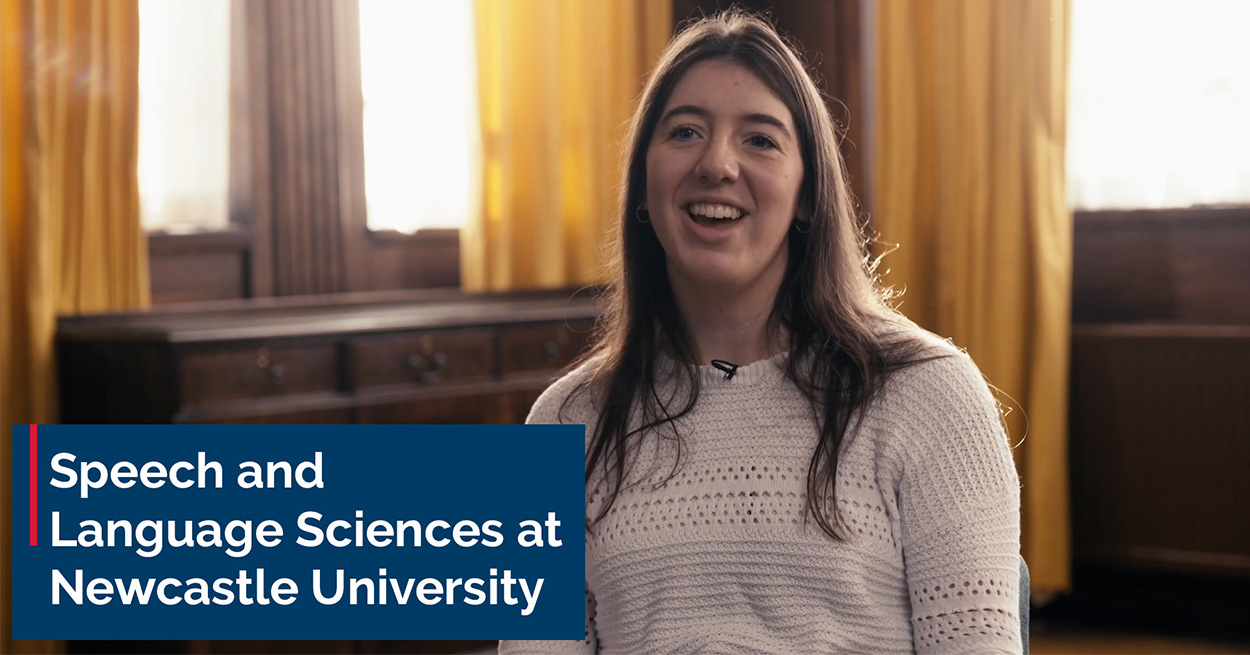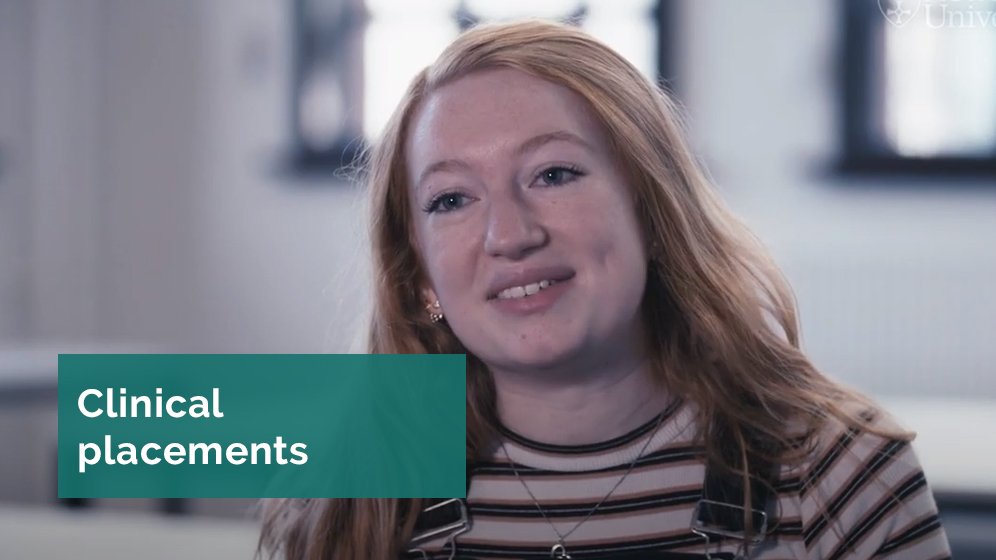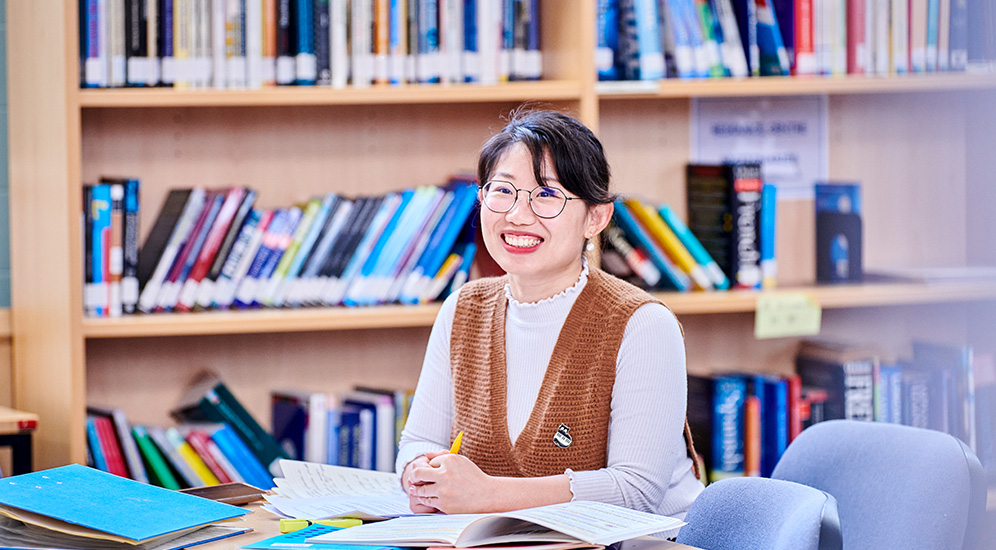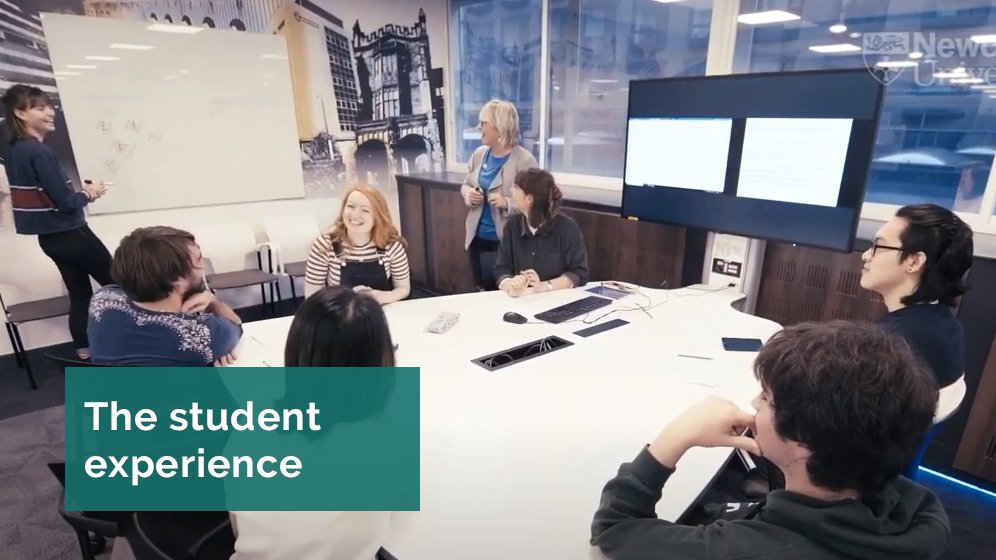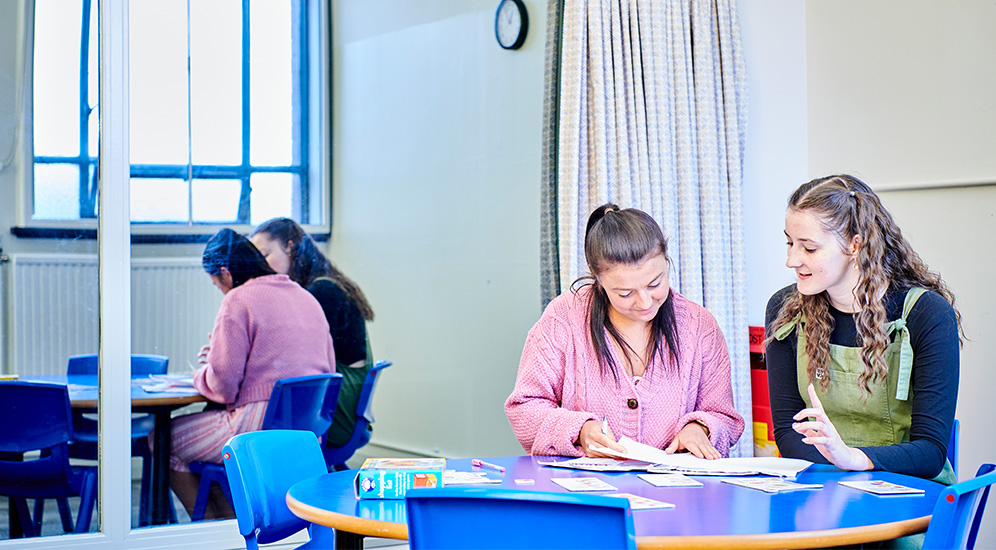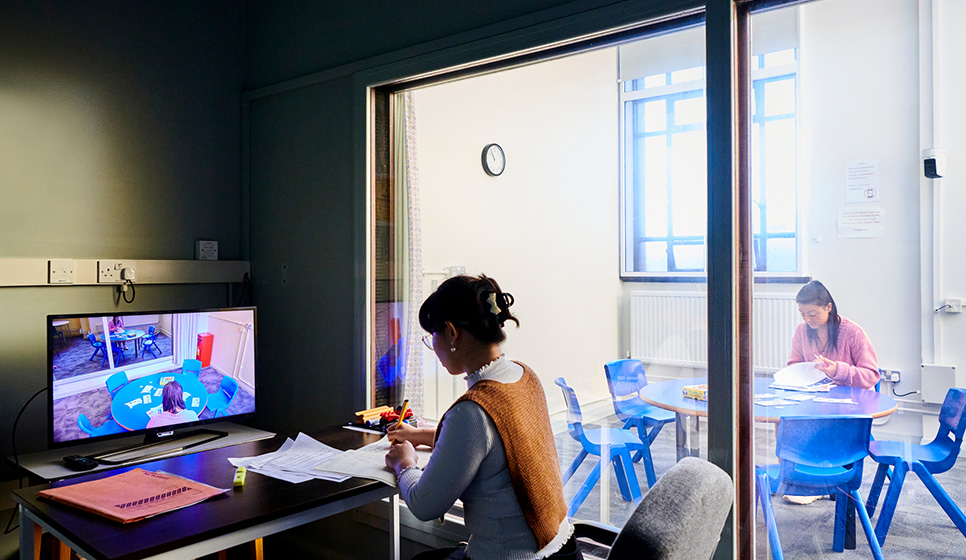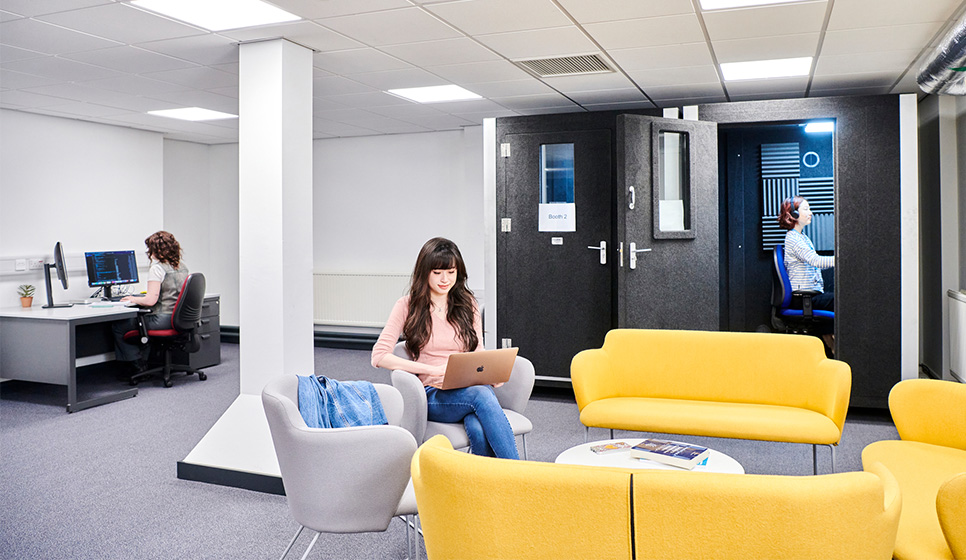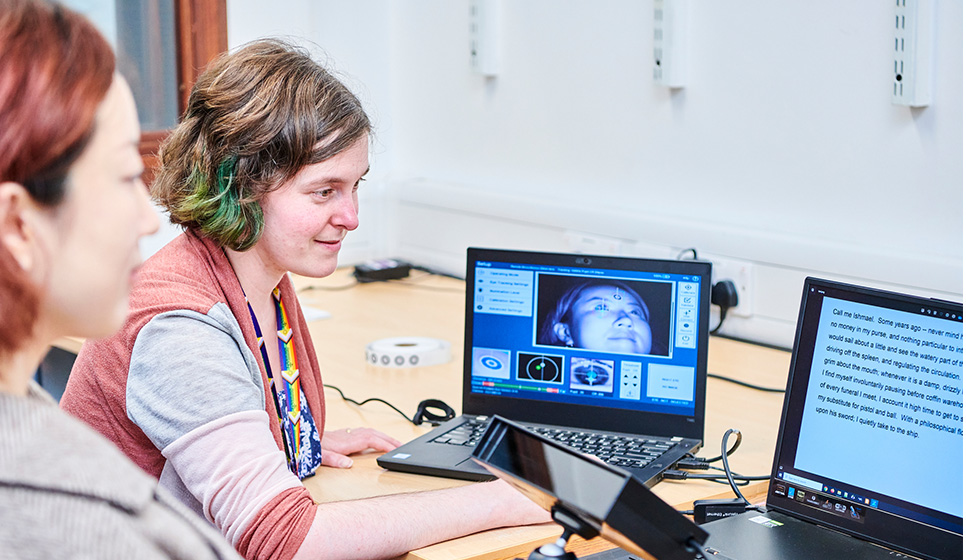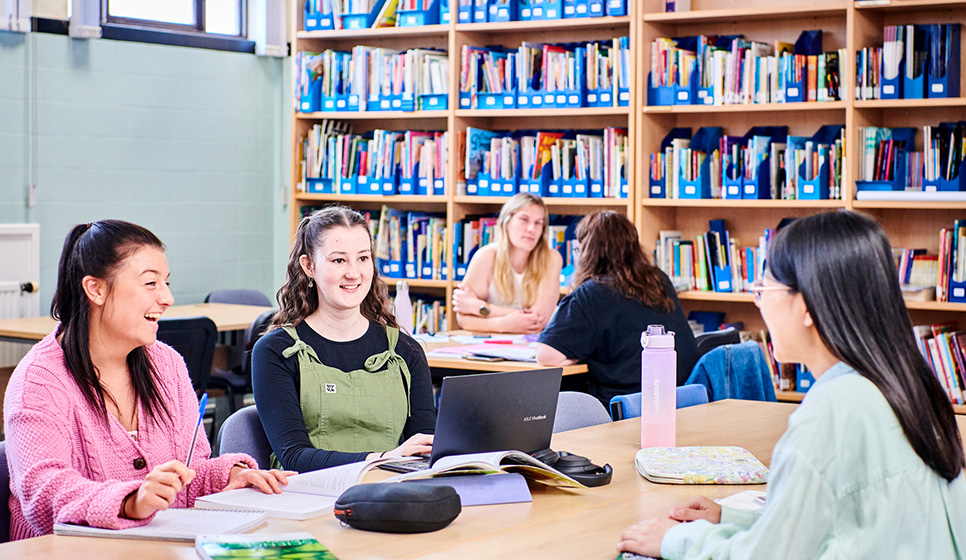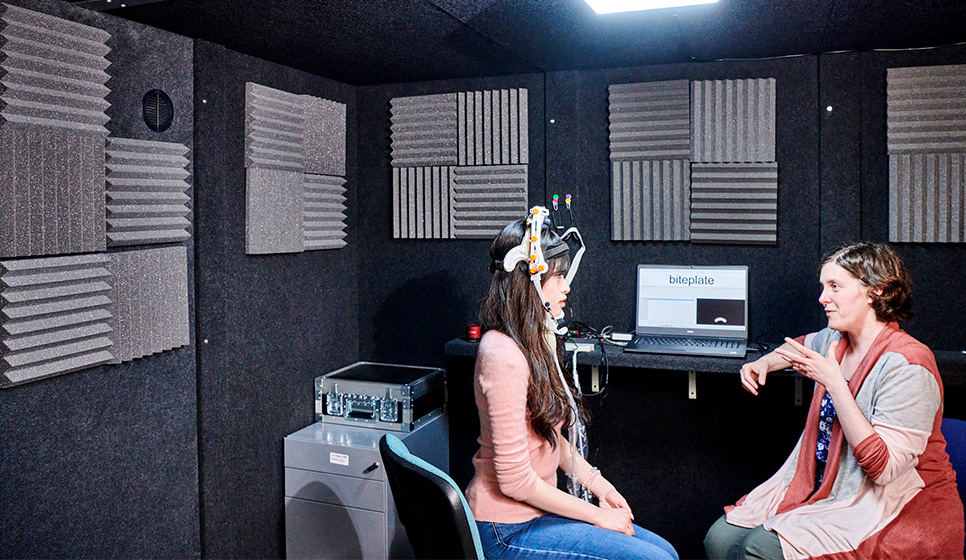Master of Speech and Language Sciences MSpeech Honours
- UCAS code: B62M
- Full time
- 4 years
Our accredited Master of Speech and Language Sciences degree will prepare you for a career as a leader in speech and language therapy.
You are currently viewing course information for entry year: 2026
Next start date:
- September 2026
UCAS Institution name and code:
- NEWC / N21
Course overview
Gain the knowledge and experience to undertake speech and language therapy practice.
On our four year degree you'll study core modules in speech and language pathology. These include causes, diagnosis, assessment and treatment of a range of speech, language, communication and swallowing disorders in adults and children.
You'll gain an understanding of speech and language therapy practice through case-based teaching. You will discuss real-life scenarios and high levels of clinical work.
The programme includes clinical experience during each year. You'll put theory into practice and gain a scientifically-oriented theoretical understanding of speech and language therapy. This ensures you'll graduate a confident and skilled Speech and Language Therapist.
Your course and study experience - disclaimers and terms and conditions
Please rest assured we make all reasonable efforts to provide you with the programmes, services and facilities described. However, it may be necessary to make changes due to significant disruption, for example in response to Covid-19.
View our Academic experience page, which gives information about your Newcastle University study experience for the academic year 2025-26.
See our terms and conditions and student complaints information, which gives details of circumstances that may lead to changes to programmes, modules or University services.
Quality and ranking
Professional accreditation and recognition
All professional accreditations are reviewed regularly by their professional body.
Modules and learning
Modules
The information below is intended to provide an example of what you will study.
Most degrees are divided into stages. Each stage lasts for one academic year, and you'll complete modules totalling 120 credits by the end of each stage.
Our teaching is informed by research. Course content may change periodically to reflect developments in the discipline, the requirements of external bodies and partners, and student feedback.
Optional module availability
Student demand for optional modules may affect availability.
Full details of the modules on offer will be published through the Programme Regulations and Specifications ahead of each academic year. This usually happens in May.
To find out more please see our terms and conditions
We lay the foundation for later work with topics including:
- anatomy and physiology of speech and language
- linguistics and phonetics
- developmental psychology
- child language and development
- clinical education
- speech and language pathology
- research methods
You will be introduced to case-based problem-solving and case management. You will observe speech and language therapists at work, and complete a child study, working with a child and their family to observe and analyse typical development.
Modules
You will continue to study linguistics, phonetics, psychology and speech and language pathology. You will learn to apply problem-based learning to cases of developmental and acquired communication disorders. You will start to take responsibility for the assessment and treatment of clients in our campus clinics under the supervision of expert staff.
Modules
You'll undertake clinical placements in a range of speech and language therapy services, including:
- Hospitals
- Nurseries
- Schools
- rehabilitation settings
- charities
You'll develop your knowledge and understanding of specific client groups such as clients with autism or dementia.
You’ll apply your knowledge to the understanding of communication disorders.
Within the dysphagia module, you'll complete the RCSLT pre-registration Eating, Drinking and Swallowing competencies.
There is an increasing consideration of research in practice and how speech and language therapists can contribute to the evidence base.
You will also choose your topic for supervisor-supported independent research, leading to your final dissertation in Stage 4.
Modules
You will continue to build on your knowledge and understanding of the professional context of clinical practice and relevant legislation. There is an in-depth consideration of the role of the speech and language therapists, not only as clinicians, but also as advocates for and future leaders of the profession.
You will carry out further placements, with a unique opportunity to carry out a placement-based service evaluation project and develop your clinical skills on a further block placement.
You will build on your previous research work to conduct your independent research project, leading to your research dissertation.
Modules
| Compulsory Modules | Credits |
|---|---|
| Research Methods in Practice IV | 60 |
| Professional Issues and Leadership | 20 |
| Clinical and Professional Education IV | 40 |
We base these figures and graphs on the most up-to-date information available to us. They are based on the modules chosen by our students in 2024-25.
Teaching time is made up of:
- scheduled learning and teaching activities. These are timetabled activities with a member of staff present.
- structured guided learning. These are activities developed by staff to support engagement with module learning. Students or groups of students undertake these activities without direct staff participation or supervision
Teaching and assessment
Teaching methods
We use innovative teaching methods and models in our academic and clinical teaching. Case-based teaching and problem-based learning accompany lectures and seminars. You will also benefit from the experience and expertise of our visiting lecturers who are experts in their field.
Our teaching methods develop deep learning, critical thinking, reflection skills and creativity. This enables you to deal with the diverse nature of Speech and Language Therapy practice.
Assessment methods
You'll be assessed through a combination of:
-
Assignments – written or fieldwork
-
Case studies
-
Dissertation or research project
-
Essays
-
Examinations – practical or online
-
Group work
-
Presentations
-
Projects
-
Reflective report/journal
-
Reports
-
Seminar tasks/exercises
Skills and experience
Practical skills
You will have access to state-of-the-art facilities. This includes:
- our language analysis lab for the transcription and analysis of recorded samples of language
- our campus clinics
- the Children's Speech and Language Clinic
- the Tavistock Aphasia Centre
You will benefit from observing qualified therapists at work. You'll begin your clinical work experience treating adults and children with communication difficulties.
Professional skills
You will develop practical, workplace skills through clinical experiences, embedded throughout your degree. You'll have extensive experience in the assessment, diagnosis and treatment of clients with communication and swallowing difficulties.
You will carry out a clinical service-based project evaluating an aspect of service delivery during your fourth year. This gives you:
- further exposure to clinical work
- an opportunity to develop leadership skills. These skills will be focused on quality improvement in a real-world clinical context
Research skills
You will consolidate your knowledge of research methods and skills. You'll apply these skills as you complete your dissertation project. There will be opportunities to:
- collaborate with leaders in the field and contribute to the evidence-base for the profession
- develop research presentation skills, for example, designing a research poster of your work
Opportunities
You will undertake a variety of work placements throughout your degree.
The clinical placement opportunities embedded throughout your degree will provide you with the clinical experience you need to apply for registration with the Health and Care Professions Council.
This experience will include:
- video and live observations of a range of clients with communication difficulties
- child study – working with a child and their family to observe and analyse typical development
- clinical placements in our in-house campus clinics: The Children’s Speech and Language Clinic, and The Tavistock Aphasia Centre throughout your second year
- a series of external placements, including a service evaluation project, in local settings such as hospitals, clinics and schools during your third and fourth years
Facilities and environment
Facilities
As a speech and language sciences student, you'll be based in the School of Education, Communication and Language Sciences at our city-centre campus.
You will benefit from excellent facilities, including well-established in-house clinics. These are equipped with observational facilities and the latest recording technology to maximise your learning.
Our facilities include:
- The Children's Speech and Language Clinic, dedicated to working with children
- The Tavistock Aphasia Centre, dedicated to working with adults with acquired communication difficulties
You will also have access to:
- a language analysis lab for transcription and analysis of recorded samples of language
- our resource centre
Support
You'll have the support of an academic member of staff as a personal tutor throughout your degree to help with academic and personal issues.
Peer mentors will help you in your first year. They are fellow students who can help you settle in and answer any questions you have when starting university.
Your future
Our degree provides a direct pathway to a career as a qualified speech and language therapist. The successful completion of this degree provides eligibility to apply for registration with the Health and Care Professions Council (HCPC) as a Speech and Language Therapist. You can also apply for membership to the Royal College of Speech and Language Therapists (RCSLT).
Many speech and language therapist graduates work for the NHS, in:
- hospitals
- clinics
- paediatric assessment centres
- adult rehabilitation centres
- in the community
Other graduates work for schools and charities or work in private practice.
Speech and language therapists usually work as part of a multidisciplinary team, alongside other health professionals such as doctors, nurses, psychologists, physiotherapists and occupational therapists.
Once you qualify, you can specialise in a particular area of speech and language therapy.
If you wish to work with language-disordered children in a classroom setting, you may want to take a one-year teaching qualification (PGCE) after your degree.
A number of our graduates have also gone on to take up research posts.
Make a difference
Sorry, you need JavaScript to view this video
Careers support
Our Careers Service is one of the largest and best in the country, and we have strong links with employers. We provide an extensive range of opportunities to all students through our ncl+ initiative.
Visit our Careers Service website
Recognition of professional qualifications outside of the UK
If you’re studying an accredited degree and thinking about working in Europe after you graduate, the best place to find current information is the UK Government’s guidance on recognition of UK professional qualifications in EU member states. This official resource explains whether your profession is regulated in another country, what steps you need to take, and which organisation you should contact.
Entry requirements
All candidates are considered on an individual basis and we accept a broad range of qualifications.
The entrance requirements and offers below apply to 2026 entry.
| A-Level | |
|---|---|
| International Baccalaureate | |
|---|---|
Other UK and the Republic of Ireland qualifications
Alternative offers at Newcastle
Through one of our contextual or alternative offer routes, you could receive an offer of up to three grades lower than the typical requirements.
Contextual offers
We use certain contextual data from your UCAS form, alongside your application, to consider challenges that you may have faced in your education and the potential effect this may have had on your qualifications. This means you may be eligible to receive a lower contextual offer.
PARTNERS offers
One of the largest and longest support entry routes to university of its kind for students from underrepresented backgrounds. We support applicants from application through to study.
Realising Opportunities offers
A unique programme delivered in collaboration with 10 leading, research-intensive universities in the UK. The programme is open to students in Year 12/first year of college.
Pathways to Newcastle offers
Pathways to Newcastle, our national skills entry route, is available for specific subject areas.
High Performance Athletes
We support promising athletes at the application stage, who compete in regional, national or international levels in their sport.
Qualifications from outside the UK
English Language requirements
Entrance courses (INTO)
International Pathway courses are specialist programmes designed for international students who want to study in the UK. We provide a range of study options for international students in partnership with INTO.
These courses are specifically designed for international students who want to study in the UK and progress onto one of our undergraduate degrees. Our International Study Centre, has a range of study options including:
- International Foundation
- International Year One
- English Language courses
Find out more about International Pathway courses
Admissions policy
This policy applies to all undergraduate and postgraduate admissions at Newcastle University. It is intended to provide information about our admissions policies and procedures to applicants and potential applicants, to their advisors and family members, and to staff of the University.
University Admissions Policy and related policies and procedures
Credit transfer and Recognition of Prior Learning
Recognition of Prior Learning (RPL) can allow you to convert existing relevant university-level knowledge, skills and experience into credits towards a qualification. Find out more about the RPL policy which may apply to this course.
Important information for students
Students undertaking a Speech and Language Science degree have unsupervised contact with children or vulnerable adults. The School of Education, Communication and Language Sciences must ensure students undergo an enhanced Disclosure and Barring Service (DBS) check to confirm they are fit to practise.
The School reserves the right to discontinue the studies of any student who receives an unsatisfactory DBS disclosure.
Visit the UK Government's website for more DBS information
What we are looking for in applicants
Our accredited Master of Speech and Language Sciences degree will prepare you for a career as a leader in speech and language therapy.
You'll need the following to study this degree:
- excellent spoken and written communication and organisational skills
- to be able to work in a physically demanding environment (e.g. on clinical placement)
- to be able to work with people with eating, drinking and swallowing difficulties
- emotional resilience when helping people who find it hard to communicate
- to be personally attuned to the NHS values as stated in the NHS constitution
You will be asked to undertake Occupational Health checks prior to the course.
Find out more about how health conditions and disabilities may affect your studies and the support that will be available:
Tuition fees and scholarships
Tuition fees for academic year 2026-2027
The 2026 entry home fees have not yet been confirmed.
| Qualification: MSpeech Honours | |
|---|---|
|
Home students full time 4 years |
Tuition fees (Year 1)
Not set |
|
International students full time 4 years |
Tuition fees (Year 1)
27,000 |
NHS Learning Support Fund
You may be eligible for a Training Grant of up to £5,000 per academic year, plus financial support, via the NHS Learning Support Fund.
Year abroad and additional costs
For programmes where you can spend a year on a work placement or studying abroad, you will receive a significant fee reduction for that year.
Some of our degrees involve additional costs which are not covered by your tuition fees.
Scholarships
Find out more about:
Open days and events
You'll have a number of opportunities to meet us throughout the year at our on-campus and virtual open days.
You'll be able to:
- explore our beautiful campus
- find out about our vibrant city
- discover what students think about studying at Newcastle
You'll also have the opportunity to speak to academic staff and find out more about the subjects you're interested in.
Find out about how you can visit Newcastle in person and virtually.
We regularly travel overseas to meet with students interested in studying at Newcastle University. Visit our events calendar to find out when we're visiting your region.
How to apply
Apply through UCAS
To apply for undergraduate study at Newcastle University, you must use the online application system managed by the Universities and Colleges Admissions Service (UCAS). All UK schools and colleges, and a small number of EU and international establishments, are registered with UCAS. You will need:
- the UCAS name and institution codes for Newcastle University (NEWC/N21)
- the UCAS code for the course you want to apply for
- the UCAS 'buzzword' for your school or college
If you are applying independently, or are applying from a school or college which is not registered to manage applications, you will still use the Apply system. You will not need a buzzword.
Apply through UCASApply through an agent
International students often apply to us through an agent. Have a look at our recommended agents and get in touch with them.
Get in touch
By phone
Call us on +44 (0) 191 208 3333 and press option 1. Our opening hours are Monday to Friday 10am until 4pm.
Live chat
Our NCL chatbot might be able to give you an answer straight away. If not, it’ll direct you to someone who can help.
You'll find our NCL chatbot in the bottom right of this page.
Online
Chat to our students
Choosing a university is a big decision. If you've got questions about a particular course, student life or the city of Newcastle, why not chat to our friendly students or graduates!
Questions about this course?
If you have specific questions about this course you can contact:
Programme Secretary
School of Education, Communication and Language Sciences
Telephone: +44 (0) 191 208 6799
Email: speech@ncl.ac.uk
Keep updated
We regularly send email updates and extra information about the University.
Receive regular updates by email